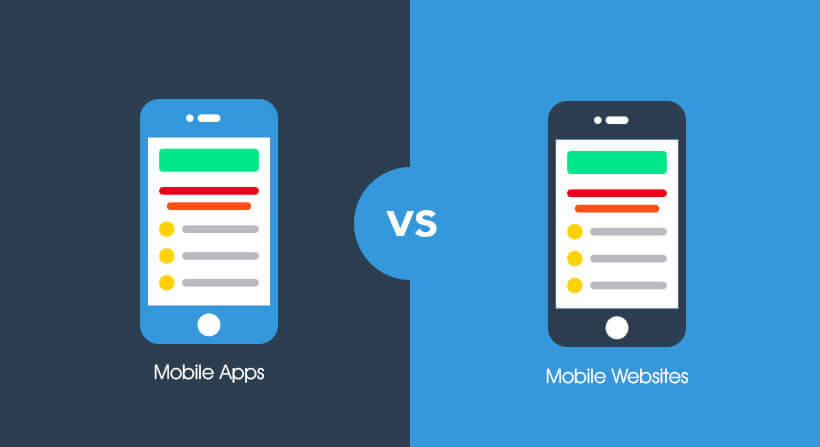Mobile apps vs. Mobile sites: which one is good for retail business?
- 218 Views |
- by ohoshop |
- in Mobile Apps

With the emergence of the mobile handheld device as one of the fastest growing platforms of generating sales for many retail stores today, the debate is now raging whether it is more beneficial to have a full fledged retail mobile application developed or to use the mobile integration of the existing website towards the promotion of retail sales. Whereas according to tech website Compuware, the consumer preference seems to be overwhelmingly in favour of the apps, with 85% of the respondents favouring the mobile app over the mobile website for their purchases, there still are strong counterviews to the argument. In fact, in a survey by Xtreme Labs, it was found that 1 in every 3 top US retailer did not have a Smartphone app, while the ones that had were suffering from various inhibiting features.
Let us try and study the argument pragmatically and find out which one of the two approaches is better in terms of sales maximisation for a retailer:
Cost Effective: It is no secret that most e retailers, specially the upcoming ones are pressed on margins, primarily due to the high cost of customer acquisition and brand building expenses, in that scenario, spending on an exclusive application, might not seem the obvious choice.
Easy to Share: The URLs of a mobile website is easy to share and forward with a simple link share through an email or text message or through a social media post. The retailers can easily direct users to a mobile website, not requiring any downloads or filling of details, unlike that for an app.
Multiple Device Compatibility: Mobile websites are compatible across devices without the use of app store platforms such as ions or Android etc. which makes it more standardised in appearance and content management and can be effectively used by all mobile device operators, independent of the brand of the mobile phone.
Easy to Upgrade: Mobile websites are upgradable and editable easily and does not need the participation of the user for those edits to take effect from the users point of view, whereas app upgrades have to be notified to the users and then it depends on them whether they chose to upgrade it or not, although many apps now come with automatic updating options.
Push Notifications: Whereas in the mobile web experience, email is the only way of communicating with the users, the mobile app really transforms this interaction by enabling the use of real time push or in app notifications, that the customer does not need to log in to view and is far more practical and effective in brand communications and outreach strategies. This is one of the most important reasons for local stores or retailers to go for apps since according to some reports push notifications have generated a click through rate of more than 40%.
Using the Mobile Features: The mobile phones these days come with a lot of pre installed applications such as the camera, GPS, compass, accelerometer, scanner etc. A mobile app can integrate these features in the development of the app and make the app much more personalized and fun to use. These features of mobile app can be really helpful for customers to locate retailers in their localities.
Mobile website does not have these integration possibilities since these are not dependant on the features of the mobile handset. These features can affect the time taken to perform tasks in an app significantly and can aid conversions.
Offline Compatibility: Whereas the mobile app will need internet connectivity for most real time features, still many features in a mobile app can be accessed and used offline. This is a great feature and is not available in the mobile website which essentially needs and internet connectivity to be accessed. One can read an article or access a catalogue of products or browse features perhaps without being connected continuously to the internet.
Faster Speed: A mobile app, since it is specifically designed to offer certain features, works much faster than a typical mobile website and can be accessed and navigated much easily. The call-to-action tabs are more efficiently incorporated in an app and it’s easy for the customer to reach the exact information, easily and seamlessly.
Since the apps store their data locally on the devices whereas the websites store the data on web servers, the mobile apps are much faster to access the preferences etc. and convert those into actions. Mobile websites use JavaScript code to perform most of their functions which is slower than most of the framework that mobile apps use.
Versatility to Designers: Whereas mobile websites depend on a host of browser functionalities for performance, such as the home, refresh, back or forward buttons, mobile apps do not have these restrictions and can therefore be designed in a much more independent and customized way, including using the gesture controls etc that are very practical and effective in generating participation and engagement.
In conclusion, it can be said that both the mobile websites and the mobile apps have its pros and cons, with a definite and well defined tilt towards the apps. With more than 8 out of 10 customers more interested in using an app for their purchases compared to mobile sites, it is imperative that more and more retailers are now choosing to invest in app development and recognising the great benefit that the integration of a mobile app can provide to the business and the customer. Whether it is the option of specific customizations or providing a great look and feel, apps are definitely going to be a first choice of mobility interface of the retailers, going forward.